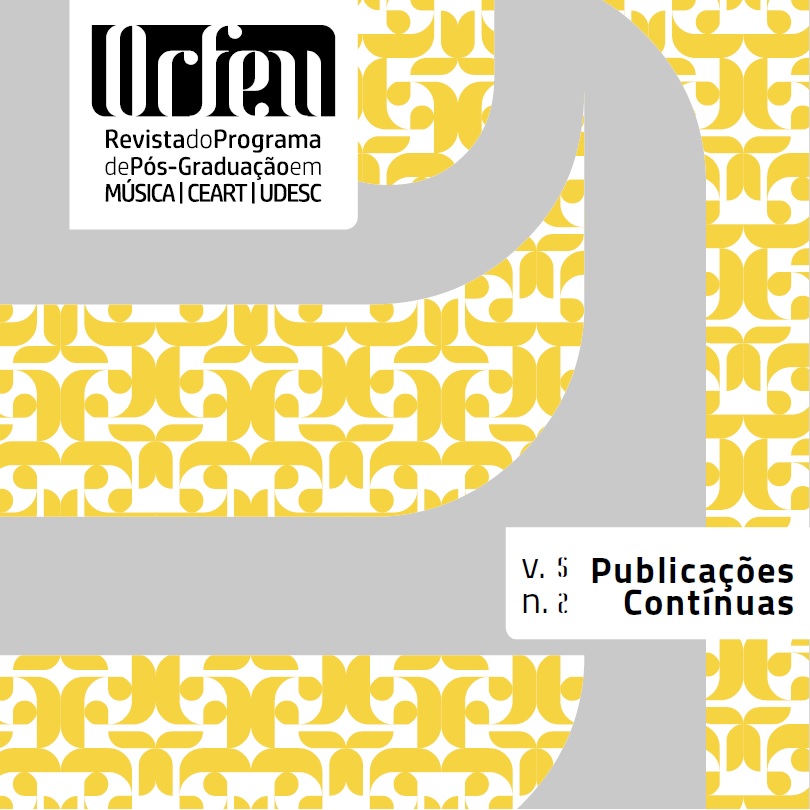DECLASSIFIED DIALOGUES Music and archive-body in the construction of an unfinished knowledge (firststeps)
DOI:
https://doi.org/10.5965/2525530405022020e0006Keywords:
Music, Archive-Body, Classification/Declassification, Construction of KnowledgeAbstract
The present study is part of the growing recognition of the importance of the archive-body for the understanding of the more specific performance practices when applied to Music. This proposal for reflection has been taking shape due to the expansion of a structural classification process present in the daily life of our societies and which has become a reason for other possible realities. In this context, we formulate critical thinking under this logic while highlighting certain questions that are important for artists and that are of interest to musicologists. The main objective is to allow the application of the concept of body-file in the field of musical studies. Starting from a set of approaches, the article, on the one hand, presents
and develops as ways in which it is possible, from the disqualification, to carry out this application. From another perspective, this work can analyze how the musicians highlighted in this process face as their performative experiences.
Downloads
References
BARROS, Klênio. A viagem da língua e tudo o que vai com a língua: música popular brasileira e interlocução de culturas nos espaços noturnos da cidade do Porto. In: CONGRESSO INTERNACIONAL “PELOS MARES DA LÍNGUA PORTUGUESA”, 3., 2016, Aveiro. Livro de Resumos [...]. Aveiro: UA Editora – Universidade de Aveiro, 2016.
BERGER, Peter L.; LUCKMANN, Thomas. A construção social da realidade. Lisboa: Dinalivro, 2010.
HISTORIAS debidas VIII: Silvia Rivera Cusicanqui. [S.l.: s.n.], 2018. 1 vídeo (56:43). Publicado pelo Canal Encuentro. Diponível em: https://www.youtube.com/watch?v=1q6HfhZUGhc. Acesso em: 08 10. 2019.
CORREIA, Jorge Salgado. Investigating Musical Performances as Embodied Socio Emotional Meaning Construction: Finding na Effective Methodology for Interpretation. 2002. Xxf. Tese (Doutoramento em Música) - Universidade de Sheffield, Inglaterra, 2002.
______. Utopia E Música. E-topia: Revista Electrónica de Estudos sobre a Utopia, n. 04, 2005. ISSN 1645-958X. Disponível em: http://www.letras.up.pt/upi/
utopiasportuguesas/revista/index.htm. Acesso em: 29 maio 2015.
CÔRTE-REAL, Maria de São José. Música e Migração. Revista Migrações, Lisboa, n. 7, out. 2010.
______. Revendo cidadania: migração e fado no jogo de identidades nos Estados Unidos. Revista Migrações, Lisboa, n. 7, out. 2010.
DERRIDA, Jacques. Mal de arquivo: Uma impressão freudiana. Rio de Janeiro: Relume
Dumará, 2001.
GARCÍA GUTIÉRREZ, Antonio L. Em Pedazos: El sentido de la desclasificación. Madrid: Editorial ACCI, 2018.
______. Cientificamente favelados: uma visão crítica do conhecimento a partir da epistemografia. Transinformação, Campinas, v. 18, n. 2, may/aug. 2006. Disponível em:
http://dx.doi.org/10.1590/S0103-37862006000200002 Acesso em: 20/12/2019.
______. La organización del conocimiento en el nuevo orden transcultural: del totalitarismo a la desclasificación. Brazilian Journal of Information Science, v. 8, n. 1-2,
parte I: 19, parte II: 34, 2014. Disponível em: http://revistas.marilia.unesp.br/revistas/in-
dex.php/bjis/issue/view/289 Acesso em: 01/01/2020.
______. Desclasificados: Pluralismo lógico y violencia de la clasificación. Barcelona: An-thropos, 2007.
GEERTZ, Clifford. A interpretação das culturas. l. ed., IS. reimpr. Rio de Janeiro: LTC, 2008. 323p.
LANGER, Suzanne. Philosophy in a new key. 3. ed. Cambridge, MA: Harvard University Press, 1996.
LATOUR, Bruno. Reagregando o social: uma introdução à Teoria do Ator-Rede. Salvador, Bauru: Edufba, Edusc, 2012.
______. On recalling ANT. In: LAW, J.; HASSARD, J. (Orgs.). Actor-network theory and after. Oxford: Blackwell Publishers, 1999. p.15-25.
MARTÍNEZ, Sílvia. De Sul para Sul: diáspora indo-paquistanesa e práticas culturais recentes em Espanha. Revista Migrações, Lisboa, n. 7, out. 2010.
MARTUCCELLI, Danilo. Gramáticas del individuo. Madrid: Losada, 2007.
______.; SINGLY, François de. Las sociologías del individuo. Santiago: LOM Ediciones, 2012.
RIBEIRO, Jorge Castro. Migração, sodade e conciliação: a prática do batuque cabo-verdiano em Portugal. Revista Migrações, Lisboa, n. 7, out. 2010.
SANTOS, Boaventura de Sousa; MENDES, José Manuel (Orgs.). Demodiversidade: imaginar novas possibilidades democráticas. Lisboa/Portugal: Edições 70, 2017.
______. Para além do pensamento abissal: das linhas globais a uma ecologia dos saberes. Revista Crítica de Ciências Sociais, n. 78, p. 3-46, 2007.
______. Para uma sociologia das ausências e uma sociologia das emergências. Revista Crítica de Ciências Sociais, n. 63, p. 237-280, out. 2002.
SARDO, Susana. O desconforto de escrever sobre música. In: GARCÍA GUTIÉRREZ, Antonio L. Em Pedazos, El sentido de la desclasificación. Madrid: Editorial ACCI, 2018.
______. Proud to be a Goan: memórias coloniais, identidades poscoloniais e música. Revista Migrações, Lisboa, n. 7, out. 2010.
SARTRE, Jean Paul. O ser e o nada: ensaio de ontologia fenomenológica. Tradução de P. Perdigão. Petrópolis: Vozes, 2005.
SMALL, Christopher. El musicar: um ritual em el espacio social. Revista Transcultural de Música Transcultural Music Review, n. 4, 1999. ISSN:1697-0101.
TÉRCIO, Daniel. Arquivar performances ou os paradoxos do corpo-arquivo. Repertório, Salvador, ano 20, n. 28, p. 93-107, 2017.
Entrevistas:
Oliveira, Antonio Henrique de. Entrevista. 2020.
Morais, Ricardo Félix de. Entrevista. 2020.
Pizzol, Fausto Lessa Fernandes. Entrevista. 2020.
Gomes, Elielson da Silva. Entrevista. 2020.
Pinho, Ivo Amorim. Entrevista. 2020.
Sousa, Iury Matias de. Entrevista. 2020.
Pedro Augusto da Silva. Entrevista. 2020.
Barros, Samuel. Entrevista. 2020.
Link para acesso as respostas:
https://drive.google.com/open?id=1N2D-YY5EPMI5ZsF5smilXQOXnc7uV_kn
Downloads
Published
How to Cite
Issue
Section
License
Copyright (c) 2020 ORFEU

This work is licensed under a Creative Commons Attribution 4.0 International License.
Authors who submit their manuscripts to be published in this journal agree to the following terms:
1. Authors retain the copyright and grant to the journal the right of first publication, whilst simultaneously permitting their work to be licensed under the Creative Commons License Attribution, which allows the sharing of work with recognition of the authorship and initial publication in this journal.
2. Contributions in this journal are open access; this means they are based in free use, and non-commercial applications.






